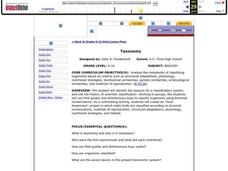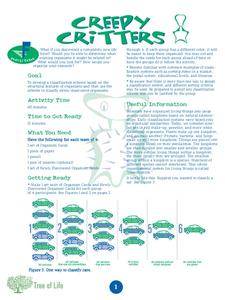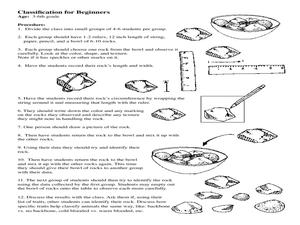Curated OER
Classifying and Sorting
In this English worksheet, students add the suffix "ic". Kids form adjectives by adding the suffix to nouns. Students choose the noun or adjective to complete the sentence.
Curated OER
Sorting Buttons
Students study sorting. In this classification lesson, students sort buttons into groups based on a common characteristic and draw two pictures illustrating the different groups.
Curated OER
Secret Codes
Students examine Morse code and how it is used. In this secret codes lesson students decode messages, make their own codes and have other students crack the code.
Curated OER
Local Organism Sort
Students determine what characteristics are useful in classifying items. In this sorting organisms lesson students create and explain a classification scheme using familiar organisms.
Curated OER
Classification of Pasta, Rice and the Nine Planets
Eighth graders create a classification system of the planets and give a written rational for their choice of categories. In this investigative lesson students participate in an activity that helps them to explore classification.
Curated OER
Tree Trekkers
Young scholars explore different types of trees. In this tree lesson, students use a digital camera to photograph trees in their area and upload them to a computer. Young scholars will share their findings by using their photos to make a...
Curated OER
Classifying Dog Breeds
Students research different dog breeds. In this classifying lesson, students gather information about dogs and classify them into different groups. Students will classify the dogs into small, medium and large breed groups. Students...
Curated OER
Taxonomy
Young scholars analyze the complexity of organism classifications based on certain criteria. In this classifying organisms lesson students study taxonomy and gather information and leaves to do their own experiment on classification.
Curated OER
Sorting
Students identify how objects can be sorted or classified for easy access. In this sorting activity, students will investigate how letters, numbers, and symbols are used in sorting and classifying.
Curated OER
The Button Box
Students classify buttons. In this classification instructional activity, students listen to the book The Button Box by Margarette S. Reid before observing, describing and classifying real buttons.
Curated OER
Roping Quadrilaterals
Learners explore with quadrilaterals. In this roping quadrilaterals lesson, students work in cooperative groups to play the game, "Question, please!" in order to identify, describe, compare and classify quadrilaterals. Learners also...
Curated OER
Using Density to Identify Wood Types
Students identify different woods based on their density. In this density lesson, students use a triple beam balance to find the mass and a metric ruler for the volume. They look through various wood blocks and identify what type of wood...
Curated OER
Are You One of Us?
Students investigate how scientists sort and classify organisms. In this sorting and classifying lesson, students examine what systematics are as tools that scientists use. They examine images of invertebrates and sort them while stating...
Curated OER
Do You Have the Key?
Students practice using a dichotomous key. In this classification lesson, students read an article about scientific exploration and identification of new species. They use a dichotomous key to identify objects and create their own key.
Curated OER
Under The Sea
In this resource instructional activity, learners use non-fiction books to research ocean animals. Students discover the many features of non-fiction books and how to use these features to help them conduct research. Learners then...
Curated OER
Creepy Critters
Learners classify imaginary newly discovered organisms. In this classification lesson, students are given cards showing imaginary organisms that have been recently discovered. They must classify the organisms based on their characteristics.
Curated OER
Living and Non-Living Things | What’s Alive?
Students compare and contrast living and nonliving things. In this classification lesson plan, students read a book featuring living and nonliving things and then sort pictures of living and nonliving things.
Curated OER
Classifying Dinosaurs
For this classifying dinosaurs worksheet, students follow directions to make a classification chart for each kind of dinosaur. Students follow 16 sets of directions.
Curated OER
Classifying Classes
In this classifications worksheet, students add levels of classifications for humans by splitting them into smaller and smaller classes. Students add 5 new levels.
Curated OER
Classification for Beginners
Students explore the process of classification. In this rock classification lesson plan, students conduct a scientific investigation that requires them to follow the provided steps to classify rocks.
Curated OER
Classification of Organisms
In this classification of organisms worksheet, students use a classification key to identify organisms, then go to a website for help in making up their own classification key.
Curated OER
Using the senses
Students use their senses to compare a frog and a hamster. In this animals comparison lesson plan, students get into groups and observe, smell, feel, and listen to what their animals are like, and classify them into categories.
Curated OER
Sorting
Students examine the concept of organization. In this library skills lesson, students practice ordering and classification skills by playing the Flood Game as well as locating and shelving books in the school library.
Curated OER
Identify, Sort, Classify
Students identify, sort, and classify. In this kindergarten math activity, students explore visual examples of sorting with 1 or more attributes. Students also practice solving problems that their instructors model.

























